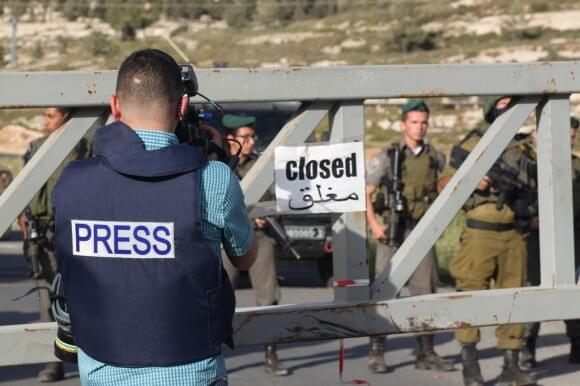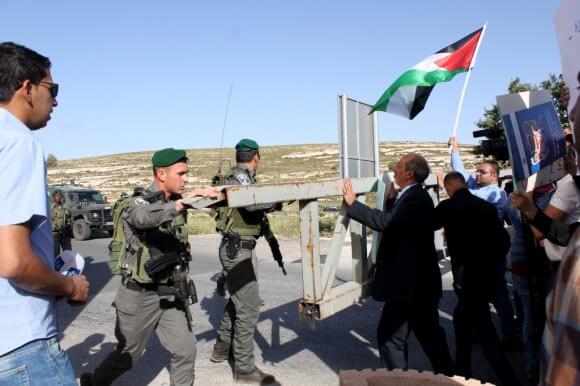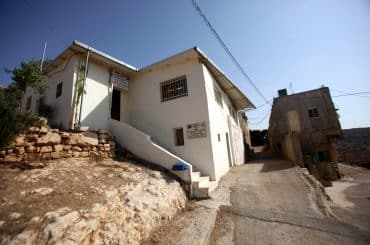
“It was a case of life and death, and I was within moments of falling victim to the kind of lynch that saw two Israeli soldiers who strayed into Ramallah in 2000 beaten to death by a baying mob,” wrote Avi Issacharoff a Middle East analyst for the Times of Israel. Issacharoff was covering a demonstration in the West Bank over the death of two teenagers killed by the Israeli army and says he got pulled away from the frontline by a group of Palestinians – allegedly journalists and/or demonstrators. Since the story broke, Issacharoff has backed away from his most sensational claims, but his initial accusation against Palestinian journalists and the reaction it received points to the great challenges Palestinian journalists face under Israeli occupation.
In an article on the incident first published in Hebrew in Walla news and then translated to English for the Times of Israel, Issacharoff described an atmosphere “on the edge of a lynch”, triggered by the aggressive attitude of “two Palestinian journalists” who required him to leave. According to Issacharoff, his rescue was only possible with the intervention of two plain clothes Palestinian intelligence officers. Israeli activist Noa Schaindliger later refuted Issacharoff’s story in Electronic Intifada. According to other eyewitnesses whose identities will not be disclosed for their own safety, Issacharoff’s attitude might have been perceived as rather provocative. His cameraman, Daniel Book, raised suspicions when filming as he was said to focus on demonstrators who hadn’t covered their faces despite the risks to their safety. Demonstrators are indeed careful to shield their identity so Israeli forces cannot use photos or videos taken by journalists in the context of a demonstration against them.
Avi Issacharoff later acknowledged the two journalists should have left when asked. Daniel Book was led to safety by Palestinian demonstrators near a TV van and asked to wait for Issacharoff. From my perspective as someone who was also present at the scene, it seemed like the majority of demonstrators were asking the two journalists to leave and avoid any escalation.
Four other Israeli journalists, David Reeb, Yisrael Puterman, Haim Schwartzenberg and Miki Katzman, were also present at the demonstration without incident.
On Twitter, Issacharoff later then seemed to indicate that the demonstrators had perceived his attitude as suspicious and that they might have taken him as a member of the Shin Bet, the Israeli intelligence. He apparently received an apology from the Palestinian Popular committees, organizers of the popular resistance actions in the West Bank.
conclusion from PRC’s investigation is there was no intension in attacking me personally but the people who did it thought I was Shin Bet
— avi issacharoff (@issacharoff) May 18, 2014
they promise that incident like that will not repeat and I’m welcome as a journalist no matter what is my nationality
— avi issacharoff (@issacharoff) May 18, 2014
“But Issacharoff has still said nothing to acknowledge the killings the previous day by Israeli occupation forces of two Palestinian teenagers,” Ali Abuminah pointed out in Electronic Intifada.
Palestinian journalists accused of incitement

Despite the changes to his story, Issacharoff’s account of the event still remains on Walla news and Times of Israel: “Very unfortunately, the incident began at the initiative of people who identified as Palestinian journalists,” he wrote.
He mentioned Ahmed Ziada as one of the Palestinian journalists who “approached” him, and then “pushed [him] forcefully away, and told [him] to get out”. I asked Riham Abu Aita, public relation officer from the Palestinian center for Development and Media Freedoms (MADA), to be put in contact with him for comments. She answered that he was apparently not part of any media staff.
For Issacharoff, the atmosphere of hostility against Israeli journalists was triggered by the ambition young Palestinian journalists have to “punish” their Israeli colleagues for not being allowed to enter Israel while Israeli journalists can freely cover the Palestinian territories. The “effort to kick Israeli journalists out of PA areas has created a violent, incendiary atmosphere against us. Almost all of my Israeli colleagues have felt, on their flesh, unpleasant incidents, to put it mildly, of late (…),” he regrets.
A campaign to protest the restrictions and violations faced by Palestinian journalists did indeed start in 2013 with occasional boycotts of press conferences attended by Israeli journalists. Amira Hass reported in Haaretz that a manifesto was also sent “to the Palestinian Journalists’ Union, with a demand that it forbid the entry of Israeli journalists as long as their Palestinian colleagues were denied freedom of movement”.
This campaign might have resulted in growing tensions between Israeli and Palestinian journalists. In May 2013, the Jerusalem Post reported on incidents in Ramallah including the expulsion of a journalist for Israeli Channel 1 from a press conference and threats apparently made against a Israeli Channel 2 crew in Ramallah al-Manara’s square.
According to Nabhan Khraishi, public relations officer from the Palestinian Journalists’ Union, this is a misunderstanding of their intentions. They are not asking to ban the Israeli journalists from entering the West Bank. “We ask the Palestinian authority to treat the Israeli journalists the same way Israel treats the Palestinian journalists (…),” he explains, “we are not asking for any restrictions, we are not the occupation, we don’t have soldiers and checkpoints to prevent the Israelis from moving. We are asking the Israeli journalists to take into consideration that the Israeli government is not allowing the Palestinians to move, or at least to support us, to support our demands.”
For al-Ayyam prize-winning Palestinian journalist Naila Khalil, who is a supporter of the campaign, Palestinian journalists are not inciting violence against their Israeli counterparts, “this is not like us. No one is speaking about violence. They [the Israeli forces] shoot us, they kill us, they put us in jail. We are the ones being attacked.”
Palestinian journalists attacked on two fronts

“The freedom of movement is a big issue for us. The journalists can’t go freely to the West Bank from Gaza, to Gaza from the West Bank, or to Jerusalem. They are searched at checkpoints or stopped, even inside the West Bank,” explains Riham Abu Aita. “The main difficulty faced by the Palestinian journalists is the Israeli occupation. They face violations and endanger their lives. Since 2000, 22 journalists have been killed.”
In April of this year, Mada center reported on six different attacks against Palestinian journalists from settlers and Israeli forces, including three arrests and one injury. “Five of our journalists are currently in jail, about twenty are prevented from travelling. We have journalists who have never been out of the West Bank because they weren’t granted permits by the Israeli authorities,” adds Naila Khalil.

Regarding the coverage of demonstrations and clashes by Palestinian journalists, Riham deplores that “unfortunately, they do not have a lot of protection whether insurance, or safety equipment, not for all of them. The salaries and work conditions are different for those working with international institutions. The local media are very weak. They don’t have safety training before going to the field.”
Palestinian journalists are also targeted by the West Bank and Gaza authorities: threats, investigations or arrests are common according to Mada Center.
Meanwhile, and as demonstrated by Issacharoff’s report on last Friday’s event, the Palestinian authorities coordinate with the Israeli authorities to provide the Israeli journalists with protection and free access to the sites of events, a treatment Palestinian journalists do not enjoy.
“Journalism is about dignity”

Last Saturday, Issacharoff released the video taken by Daniel Book during the demonstration in Walla News, despite the concerns the protestors had for their own safety. His claims of the alleged lynching attempt and his pointing at Palestinian journalists as responsible of an incident on which reports differ – could still lead to severe repercussions for both the demonstrators and the journalists if an investigation was to be opened on the incident by the Israeli authorities.
Issacharoff’s story has been widely circulated on the internet. A video posted on Youtube was presented as a report on the incident when in actuality it showed a British security man being beaten in Basra, Iraq in November 2013.
Issacharoff’s accusations against Palestinian journalists have also sparked some reactions. In an article published by the Gatestone Institute, Palestinian journalist and Jerusalem Post contributor Khaled Abu Toameh wrote “there is a new generation of Palestinian “journalists” who have been brainwashed to a point where they regard themselves as foot soldiers in a revolution. Many of them are political activists disguised as journalists, and full of hatred. They are giving journalism, and especially Palestinian journalism, a bad name.”
These accusations made against Palestinian journalists and the turn of events during last Friday’s incident highlight a great discrepancy between the treatment of Palestinian and Israeli journalists by both the Palestinian and Israeli authorities. Israeli journalists have themselves rarely condemned any attack on their Palestinian colleagues. Perhaps the only instance, reported by Amira Hass in Haaretz, occurred last year in June 2013 when 13 Israeli journalists “roundly condemn[ed] the resort to violence on the part of soldiers and policemen against Palestinian journalists” during a demonstration in the Palestinian village of Kfar Kadum. As pointed out by Hass, some Israeli journalists regret that their Palestinian colleagues apparently chose to exclude them instead of voicing their claims to them and open a dialogue on the issue.
At the same time, Palestinian journalists deplore the lack of support of Palestinian journalists by their Israeli counterparts highlighted by Avi Issacharoff’s story: “Journalism is about dignity. We want Israeli journalists to put pressure on their newspapers, on their government. Instead, they put pressure on us. It’s a shame,” says Naila Khalil.


Has it been established that these Israelis were not part of the Israeli Secret Police?
(Also, someone really needs to tell these people that saying “a lynch” makes them sound like morons.)
Always the victim.
the Gatestone Institute is a rabidly right wing org and Khaled Abu Toameh is up there w/ the worst turncoats.
btw, on world press freedom day i wrote about “Palestinian journalists protest Israeli violations on World Press Freedom Day” https://mondoweiss.net/2014/05/palestinian-journalists-violations.html
i recommend the many photos and opening the (excellent) video link.
thanks for your important report julie.
To use the whining logic of the Israeli Occupation Machine of which Isaacharoff is very much a part, if he was asked/told to leave, then why didn’t he, you know… LEAVE?
His privilege is showing. He believes he has every non-reciprocal RIGHT to be wherever he wants to be in the WB, whenever he wants to be there, without consequences (i.e. Palestinians as muted background).
As a result of his “trauma,” is Isaacharoff offering to work side by side (for a meaningful period of time, inside and outside ’67 Israel) with Palestinian journalists (especially the one who told him to leave) to see why they might be upset, or at least to get some insight into the genesis of this incident? Rhetorical question, but one would sure think that as an “intrepid” front-line reporter his instinct would be to err on the side of the first-principle factual “Why?” as opposed to the second-principle and editorial “J’accuse!” in his efforts. One would think anyway.
To cap it off, Isaacharoff is also going to have work alongside Palestinian journalists going forward. Does he think this drama helps or hurts him in that regard? Something tells me this guy is a non-serious, 15′-of-fame type. Given the comments at ToI, at the moment he’s the darling of Ugly-Israel.
So the Mondo-conclusion is: it’s the Israeli (Jews) who started it!